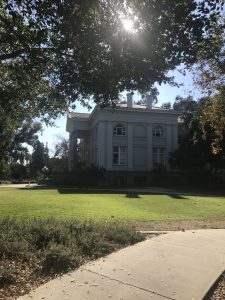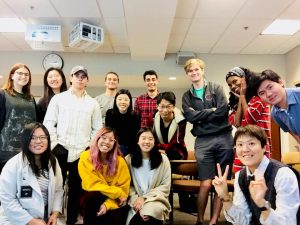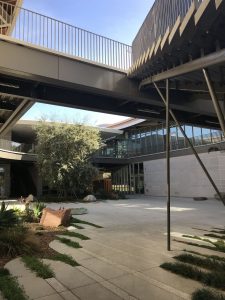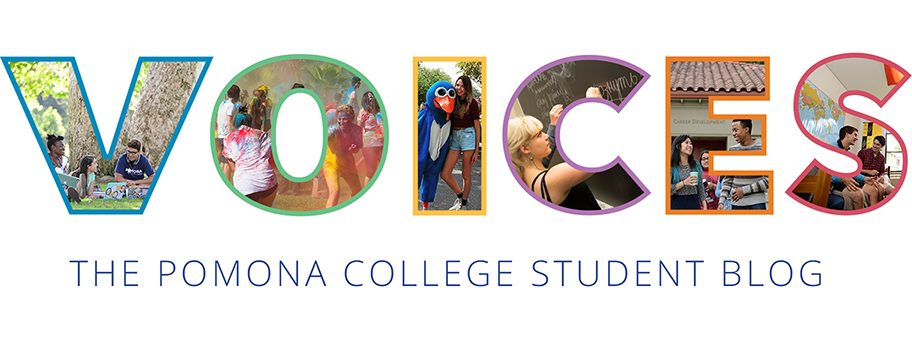By Jacinta Chen ’21
If you’re reading this, I’m guessing you’re interested in learning about how Pomona’s curriculum works and how it might work for you once you arrive on campus. In short, Pomona’s curriculum involves fulfilling six breadth of study requirements, a foreign language requirement, and a physical education requirement, as well as taking one critical inquiry seminar, one writing intensive course, one speaking intensive course, and one analyzing difference course. In addition to these requirements, students must fulfill the requirements for their respective major(s) and minor(s). Sounds like a lot, right?
Now, what does this really look like? I’ll use my academic adventure through the six breadth of study area requirements to give you a better sense of how students explore passions that they come into college with and also find new ones in course areas that were not available in high school or did not pique their interest in the past. Though I have not officially declared, I plan to major in politics and minor in history.
The Area 1 requirement involves taking a course in “Criticism, Analysis, and Contextual Study of Works of the Human Imagination,” with options ranging among art history, dance, classics, advanced literature, media studies, music, and theatre. Although I haven’t fulfilled this requirement yet, I’m planning to try out media studies, classics, or an upper-level French class. There are so many exciting options, ranging from Literary Analysis in French to English Literary Interpretation, Politics of Persuasion, Introduction to Film, and Art Conservation!
 Many students find it easy to identify a class that they’d like to take to fulfill the Area 2 requirement, and I was no exception as a likely politics major. Since students need one course in “Social Institutions and Human Behavior,” they can explore anything from anthropology, economics, environmental analysis, international relations, politics, psychology, public policy analysis, or sociology. So far, I have taken three classes that have counted for this area requirement, including Principles of Macroeconomics, US Foreign Policy, and Introduction to Psychological Science. These classes were in different departments, but I have really enjoyed all three.
Many students find it easy to identify a class that they’d like to take to fulfill the Area 2 requirement, and I was no exception as a likely politics major. Since students need one course in “Social Institutions and Human Behavior,” they can explore anything from anthropology, economics, environmental analysis, international relations, politics, psychology, public policy analysis, or sociology. So far, I have taken three classes that have counted for this area requirement, including Principles of Macroeconomics, US Foreign Policy, and Introduction to Psychological Science. These classes were in different departments, but I have really enjoyed all three.
My macroeconomics course gave me a very solid foundation in the subject matter. The professor was so thorough in his explanations and brought so much joy to the class with his enthusiasm. He also supplemented the class with readings and engaged lively class discussions. I recently worked as an economics mentor, which meant I helped current students enrolled in the course with their questions on the problem sets every week.
Meanwhile, my politics professor, who worked in the foreign service for many years, has provided me with a fascinating perspective. He has enriched the curriculum with special guest lecturers who have immense foreign policy experience, and his assignments have given us a nice taste of what it is like to operate in that world. I am really excited to take two more politics courses, one of which will have a global focus (NGOs and Transnational Politics) and the other a domestic focus (Intro to American Politics).
I’ve also enjoyed trying out psychology, since my sister is pursuing a career in psychology and it’s intriguing to learn more about the science behind how people behave. Pomona is one of the few colleges that guides students taking an introductory course so that each of us can conduct a unique psychology study ourselves.
Meanwhile, the Area 3 requirement covers history, religious studies, philosophy, multiple ethnic and cultural studies (Africana, American, Asian, Asian American, Chicano/a Latino/a, and Latin American), and gender and women’s studies.
Before coming to Pomona, I knew that the history department was reputable, and I was really excited to learn from some of the best professors and possibly choose history as a major. In my three semesters, I have taken four history classes, including my ID1 or Critical Inquiry seminar required of all first-year students: The First Crusade: Monks of War, Saints and Society, Modern East Asian History, and 20th Century Chinese History. Though I have only taken classes from two history professors, those I have worked with have been very supportive and helpful when I have gone to their office hours. I’ve gotten to know them quite well and enjoy popping by for a chat and advice in general. My experiences with them have further developed my passion for history, and I’m looking forward to taking the upper division writing seminar Early Christian Views of Islam next semester. Since I am considering a future career in law, my history classes have really helped me cultivate concision and depth in my writing and discussion skills.
To further develop my analytical skills, I decided to try out a Problems in Philosophy course during my second semester at Pomona. The course stretched me to think and reconsider life as well as weigh my classmates’ perspectives with my own. My professor consistently helped me out with papers outside of class and pushed me to strengthen my line of reasoning and formulate clearer arguments. Acquainting myself with a different type of writing for philosophy essays was a valuable experience, helping me write for other classes as well.
For the Area 4 requirement for physical and biological sciences, students can take classes in astronomy, biology, chemistry, geology, molecular biology, neuroscience, and physics. In high school, I took honors and advanced classes in chemistry, biology, and physics. Therefore, I decided it might be fun to try something new—geology!
 I was lucky to take Paleontology/Evolution of the Earth’s Biosphere from a professor who is also one of the leading researchers of the Burgess Shale and the “Cambrian Explosion.” As a humanities and social science-focused student, I found the class very refreshing. The professor took the time to explain the geology behind every student’s hometown, so I was able to learn about Hong Kong’s geologic past. The professor was always willing to answer questions I had outside of class sessions. Ultimately, I ended the semester feeling a lot more knowledgeable about the earth and our environment.
I was lucky to take Paleontology/Evolution of the Earth’s Biosphere from a professor who is also one of the leading researchers of the Burgess Shale and the “Cambrian Explosion.” As a humanities and social science-focused student, I found the class very refreshing. The professor took the time to explain the geology behind every student’s hometown, so I was able to learn about Hong Kong’s geologic past. The professor was always willing to answer questions I had outside of class sessions. Ultimately, I ended the semester feeling a lot more knowledgeable about the earth and our environment.
As for Area 5, Pomona students can pick from computer science, mathematics, formal logic, and statistics courses. I decided to take a basic foundational class in Calculus for this requirement. The structure of this class involved multiple problem sets and projects, culminating in an open-ended research project that would require calculus concepts.
Finally, the Area 6 requirement at Pomona calls for “Creation and Performance of Works of Art and Literature,” including courses in studio art, creative writing, dance performance, media studies production, musical performance and composition, and theatre performance.
 I have yet to fulfill this requirement because I am waiting for the perfect class to open up and fit my schedule; however, Pomona offers an array of exciting possibilities! I have friends taking Black and White Photography, Theatre Make-Up, Balinese Gamelan Drumming, and more! I have always loved art and photography, so I am hoping to take a photography, painting, drawing, or graphic design class to mix things up in my junior year.
I have yet to fulfill this requirement because I am waiting for the perfect class to open up and fit my schedule; however, Pomona offers an array of exciting possibilities! I have friends taking Black and White Photography, Theatre Make-Up, Balinese Gamelan Drumming, and more! I have always loved art and photography, so I am hoping to take a photography, painting, drawing, or graphic design class to mix things up in my junior year.
So, there you have it! Pomona’s six area requirements allow for ample exploration. Being able to take classes in these areas has enriched my college education, and I am excited to continue pursuing a well-rounded liberal arts education in the semesters to come.
